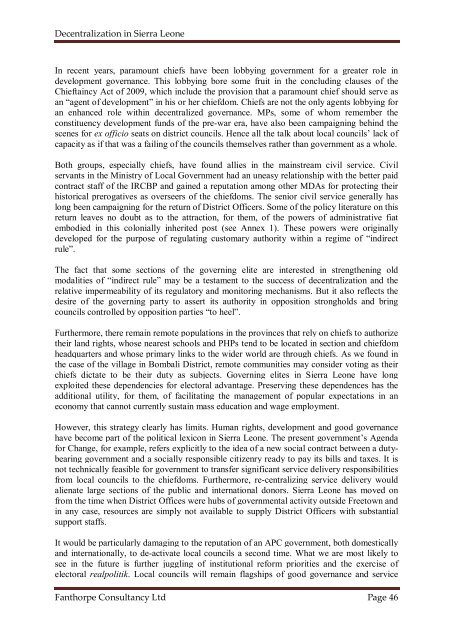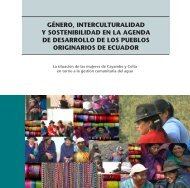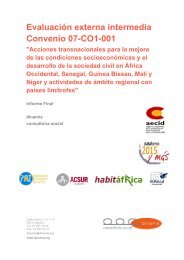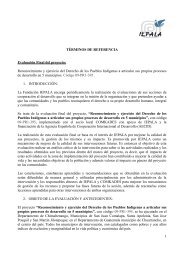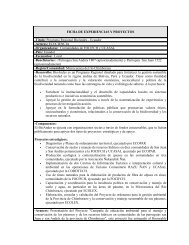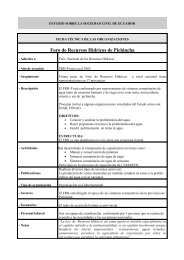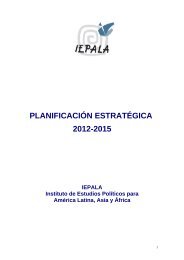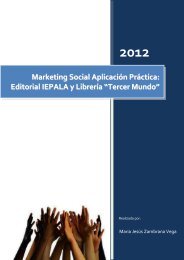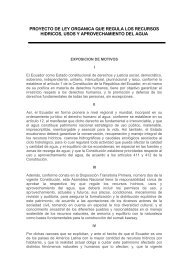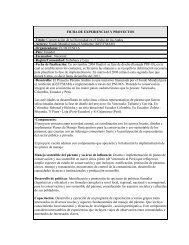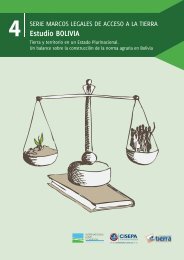Decentralization in Sierra Leone - Research for Development
Decentralization in Sierra Leone - Research for Development
Decentralization in Sierra Leone - Research for Development
Create successful ePaper yourself
Turn your PDF publications into a flip-book with our unique Google optimized e-Paper software.
<strong>Decentralization</strong> <strong>in</strong> <strong>Sierra</strong> <strong>Leone</strong>In recent years, paramount chiefs have been lobby<strong>in</strong>g government <strong>for</strong> a greater role <strong>in</strong>development governance. This lobby<strong>in</strong>g bore some fruit <strong>in</strong> the conclud<strong>in</strong>g clauses of theChiefta<strong>in</strong>cy Act of 2009, which <strong>in</strong>clude the provision that a paramount chief should serve asan “agent of development” <strong>in</strong> his or her chiefdom. Chiefs are not the only agents lobby<strong>in</strong>g <strong>for</strong>an enhanced role with<strong>in</strong> decentralized governance. MPs, some of whom remember theconstituency development funds of the pre-war era, have also been campaign<strong>in</strong>g beh<strong>in</strong>d thescenes <strong>for</strong> ex officio seats on district councils. Hence all the talk about local councils’ lack ofcapacity as if that was a fail<strong>in</strong>g of the councils themselves rather than government as a whole.Both groups, especially chiefs, have found allies <strong>in</strong> the ma<strong>in</strong>stream civil service. Civilservants <strong>in</strong> the M<strong>in</strong>istry of Local Government had an uneasy relationship with the better paidcontract staff of the IRCBP and ga<strong>in</strong>ed a reputation among other MDAs <strong>for</strong> protect<strong>in</strong>g theirhistorical prerogatives as overseers of the chiefdoms. The senior civil service generally haslong been campaign<strong>in</strong>g <strong>for</strong> the return of District Officers. Some of the policy literature on thisreturn leaves no doubt as to the attraction, <strong>for</strong> them, of the powers of adm<strong>in</strong>istrative fiatembodied <strong>in</strong> this colonially <strong>in</strong>herited post (see Annex 1). These powers were orig<strong>in</strong>allydeveloped <strong>for</strong> the purpose of regulat<strong>in</strong>g customary authority with<strong>in</strong> a regime of “<strong>in</strong>directrule”.The fact that some sections of the govern<strong>in</strong>g elite are <strong>in</strong>terested <strong>in</strong> strengthen<strong>in</strong>g oldmodalities of “<strong>in</strong>direct rule” may be a testament to the success of decentralization and therelative impermeability of its regulatory and monitor<strong>in</strong>g mechanisms. But it also reflects thedesire of the govern<strong>in</strong>g party to assert its authority <strong>in</strong> opposition strongholds and br<strong>in</strong>gcouncils controlled by opposition parties “to heel”.Furthermore, there rema<strong>in</strong> remote populations <strong>in</strong> the prov<strong>in</strong>ces that rely on chiefs to authorizetheir land rights, whose nearest schools and PHPs tend to be located <strong>in</strong> section and chiefdomheadquarters and whose primary l<strong>in</strong>ks to the wider world are through chiefs. As we found <strong>in</strong>the case of the village <strong>in</strong> Bombali District, remote communities may consider vot<strong>in</strong>g as theirchiefs dictate to be their duty as subjects. Govern<strong>in</strong>g elites <strong>in</strong> <strong>Sierra</strong> <strong>Leone</strong> have longexploited these dependencies <strong>for</strong> electoral advantage. Preserv<strong>in</strong>g these dependences has theadditional utility, <strong>for</strong> them, of facilitat<strong>in</strong>g the management of popular expectations <strong>in</strong> aneconomy that cannot currently susta<strong>in</strong> mass education and wage employment.However, this strategy clearly has limits. Human rights, development and good governancehave become part of the political lexicon <strong>in</strong> <strong>Sierra</strong> <strong>Leone</strong>. The present government’s Agenda<strong>for</strong> Change, <strong>for</strong> example, refers explicitly to the idea of a new social contract between a dutybear<strong>in</strong>ggovernment and a socially responsible citizenry ready to pay its bills and taxes. It isnot technically feasible <strong>for</strong> government to transfer significant service delivery responsibilitiesfrom local councils to the chiefdoms. Furthermore, re-centraliz<strong>in</strong>g service delivery wouldalienate large sections of the public and <strong>in</strong>ternational donors. <strong>Sierra</strong> <strong>Leone</strong> has moved onfrom the time when District Offices were hubs of governmental activity outside Freetown and<strong>in</strong> any case, resources are simply not available to supply District Officers with substantialsupport staffs.It would be particularly damag<strong>in</strong>g to the reputation of an APC government, both domesticallyand <strong>in</strong>ternationally, to de-activate local councils a second time. What we are most likely tosee <strong>in</strong> the future is further juggl<strong>in</strong>g of <strong>in</strong>stitutional re<strong>for</strong>m priorities and the exercise ofelectoral realpolitik. Local councils will rema<strong>in</strong> flagships of good governance and serviceFanthorpe Consultancy Ltd Page 46


